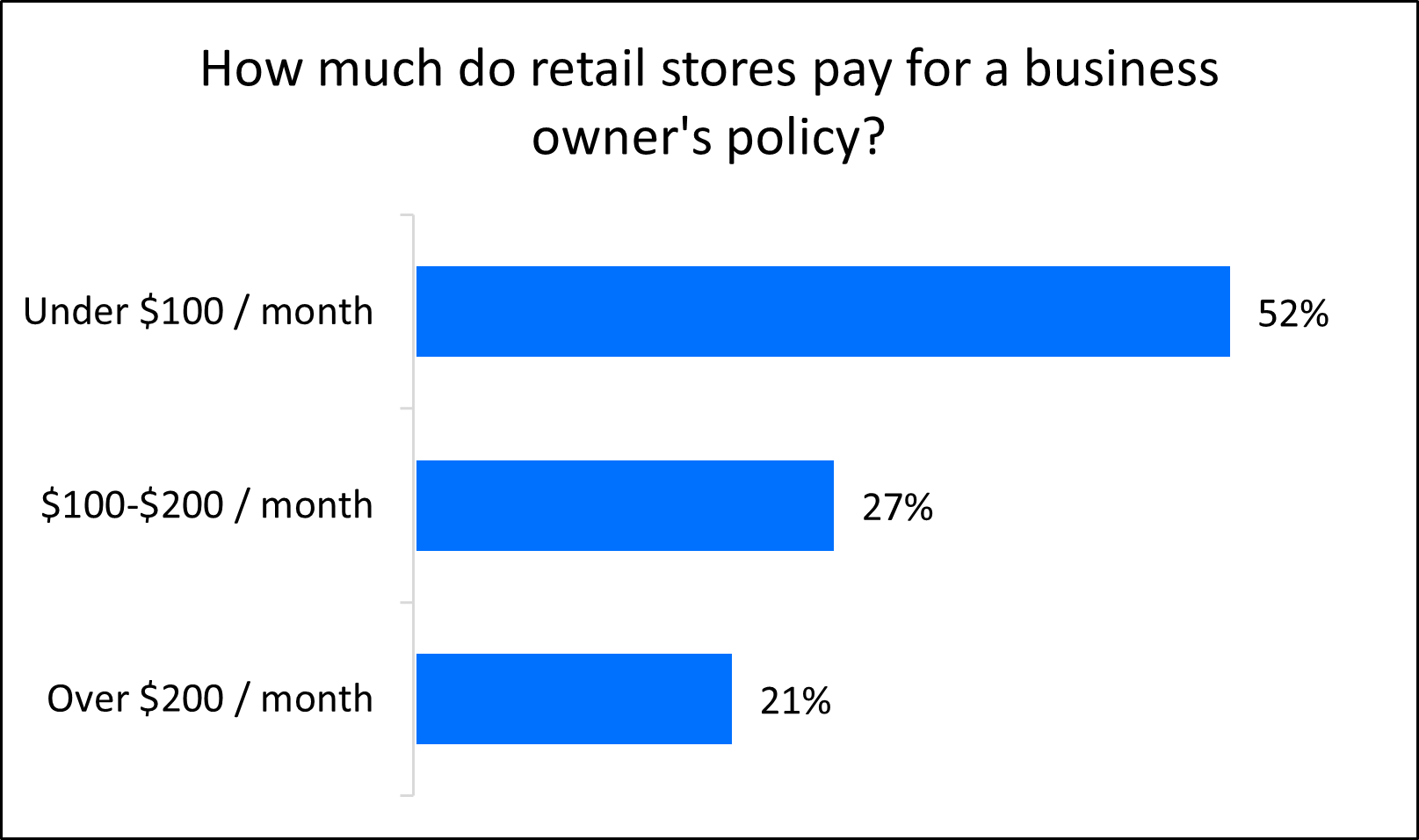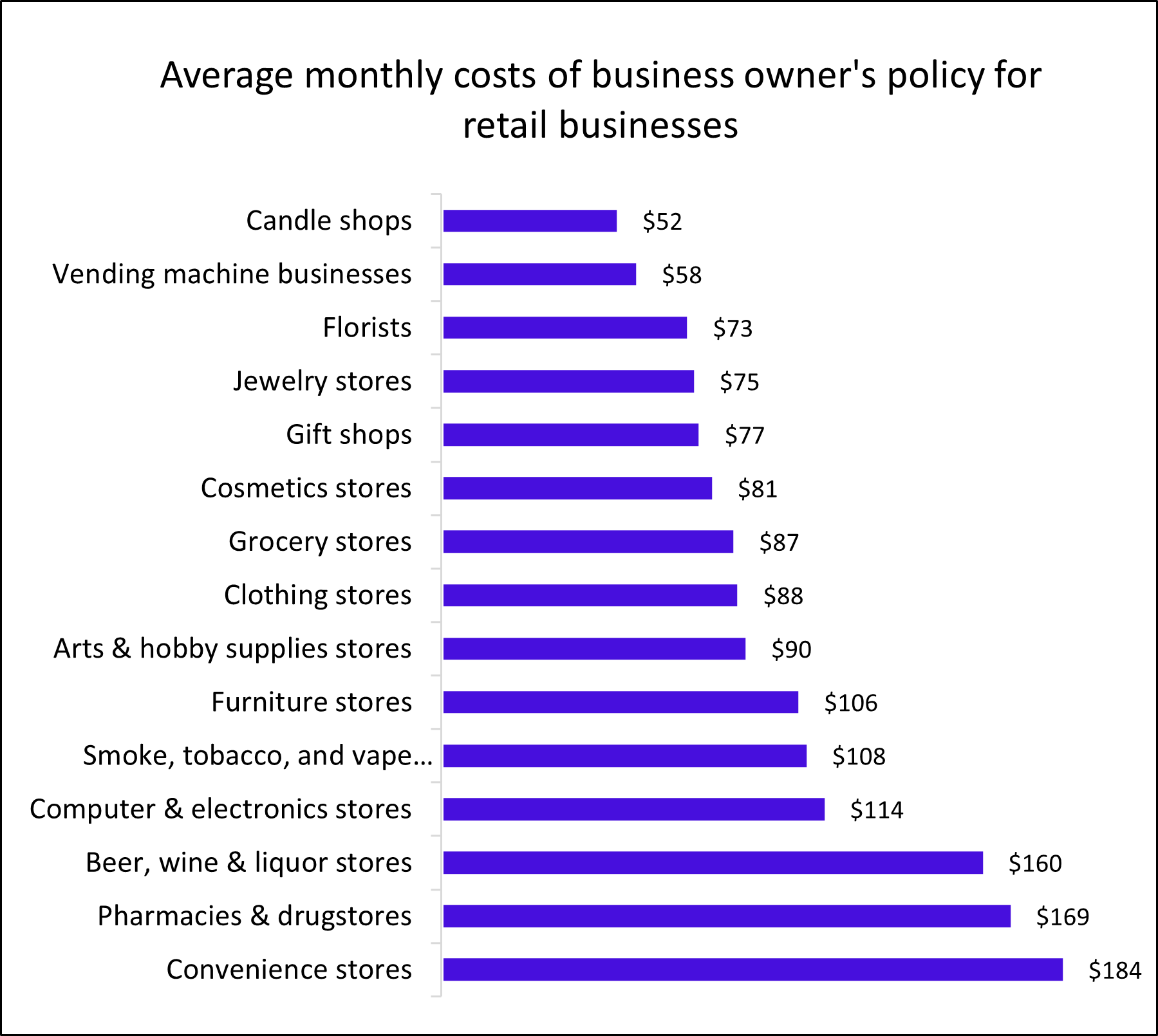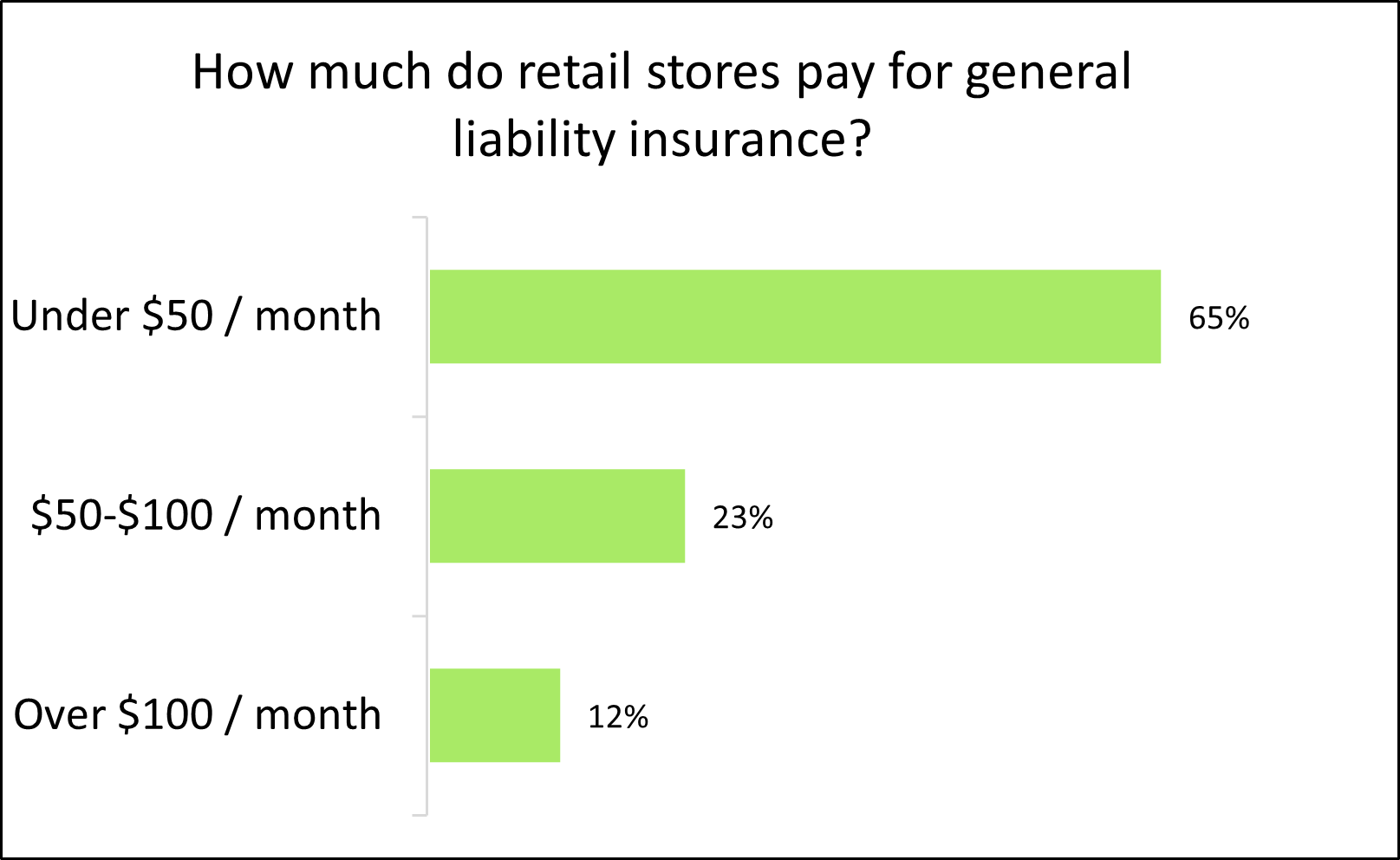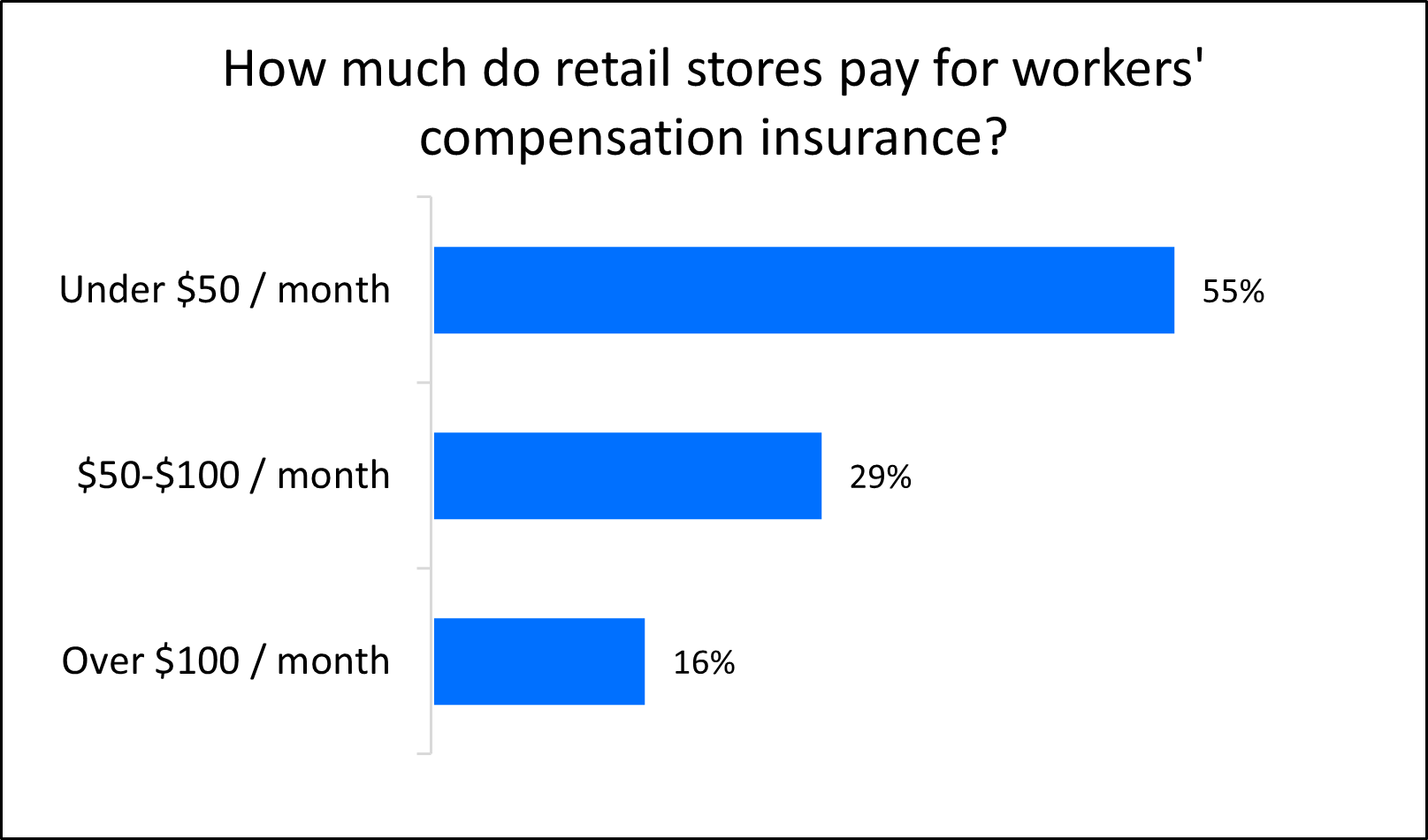How much does retail business insurance cost?
The cost of retail insurance depends on the type of policies and amount of coverage you choose. Insurers will also look at the size of your business, revenue, and claims history. Save money on small business insurance by comparing quotes from different providers with TechInsurance.
Key insurance policies and their expected costs for retail stores
Here are the top insurance policies bought by retail businesses and their average monthly costs:
- Business owner's policy (BOP): $95 per month
- General liability insurance: $42 per month
- Workers' compensation insurance: $86 per month
- Cyber insurance: $57 per month
- Commercial umbrella insurance: $59 per month
- Commercial auto insurance: $171 per month
- Liquor liability insurance: $28 per month
Our figures are sourced from the median cost of policies for retail stores that apply for quotes with TechInsurance. The median provides a better estimate of your expected business insurance policy costs because it excludes outlier high and low premiums.
Business owner's policy (BOP) costs for retail stores
Small, low-risk retail stores may be eligible for a business owner’s policy (BOP), which has an average cost of $95 per month or $1,136 annually.
A business owner's policy bundles general liability coverage with commercial property insurance at a lower rate than buying these policies separately. It protects against the most common liability and property lawsuits, and helps your retail business recover from a fire, burglary, or other property loss.
This is the average business owner's policy for retailers that buy from TechInsurance:
Premium: $95 per month
Policy limits: $1 million per occurrence; $2 million aggregate
Deductible: $500
You can add business interruption insurance to a BOP to protect against the costs of a temporary shutdown tied to a covered property claim.
For example, this policy would help pay for employee wages and the cost of renting a temporary storefront if your jewelry or clothing store is closed for renovation after a fire. Not only will this coverage allow you to keep serving customers, it can help you avoid losses related to destroyed inventory.
The cost of a business owner's policy mostly depends on the value of your business property. Other factors such as your business operations and industry risks can also affect your premium.
Save money on property and liability insurance coverage by purchasing a BOP
Fortunately, LLCs and other retail businesses don't have to pay a lot for insurance. Among retailers that buy with TechInsurance, 52% pay less than $100 per month for a business owner's policy. Another 27% pay between $100 and $200 per month.
Factors such as your business income, policy limits, and location affect your insurance costs. By choosing lower coverage limits or a higher deductible, you can reduce your premium to an amount that fits your retail store's budget.
Most retail businesses (85%) choose $1 million per-occurrence and $2 million aggregate limits for a business owner's policy.

Your profession affects the cost of a business owner's policy
The specific types of business risks at your retail store are a major factor when determining your insurance costs.
That might include:
- Whether you have a storefront
- The amount of foot traffic
- Interactions with customer property
- The claims history of others in your profession
- Types of products sold
To some extent, you can predict how much you'll pay for insurance by looking at costs for similar businesses. On average, candle shops pay a lower rate of $52 per month for a business owner's policy, while convenience stores pay a higher rate of $184 per month.
Below you can see how much different small retail business owners pay for a BOP:

General liability insurance costs for retail stores
Retail businesses spend an average of $42 per month, or $500 per year, for general liability insurance.
Flower shops, furniture stores, and other retail businesses may need this coverage in order to sign a commercial lease, get licensed, or work with certain clients.
General liability insurance covers legal costs when a third party (someone outside of your company) files a lawsuit over a bodily injury or property damage. It also helps pay for advertising injuries, such as libel, slander, and copyright infringement.
Having a storefront where you sell directly to customers opens your business to many liabilities, such as customer injury. For example, a customer could trip over an extension cord and break their wrist. If they file a lawsuit, a general liability policy would help pay for your legal costs, such as attorney's fees.
This is the average general liability insurance policy for retailers that buy from TechInsurance:
Premium: $42 per month
Policy limits: $1 million per occurrence; $2 million aggregate
Product liability insurance is usually included in a commercial general liability policy. This coverage provides protection against customers that claim they were harmed by faulty or defective products from your business.
Online retailers, such as Amazon sellers, may be required to carry this coverage if their business earns a certain amount of money in a given month.
The cost of general liability insurance depends on several factors, including the policy limits and deductible you choose. Insurance providers will also consider your type of retail business, the size of your business, and any additional insured endorsements you may have.
General liability insurance can be affordable for most retail businesses
Among retailers that purchase insurance liability insurance with TechInsurance, 65% pay less than $50 per month for general liability coverage. Another 23% pay between $50 and $100 per month.
Your policy limits, location, and income for your business will all factor into the cost of your premiums. You can help reduce your cost to an amount that better fits the budget of your retail store by selecting either lower coverage limits or a higher deductible.
The majority of retail business owners (89%) choose a general liability insurance policy with a $1 million per-occurrence limit and a $2 million aggregate limit.


Workers’ compensation insurance costs for retail stores
On average, retailers pay $86 per month for workers' compensation insurance, or an annual premium of $1,036.
State laws determine when you need workers' comp. In most states, you need it as soon as you hire your first employee. Only Texas and South Dakota do not have requirements for workers' comp, but even in areas where it isn't required, it's still recommended.
Workers' compensation coverage pays for medical expenses and provides disability benefits if you or an employee suffers an injury on the job, or develops an occupational disease.
For instance, if a computer store employee accidentally cuts their hand while opening a package, this policy would pay for their doctor appointments, treatments, and any other medical costs. It also supplies part of the income they miss out on while they're recovering and unable to work.
Most workers' compensation policies include employer's liability insurance. This type of insurance helps pay for legal defense costs related to workplace injuries.
Though sole proprietors and independent contractors aren't often required to carry workers' comp, it's still a good idea to buy this coverage. If you're injured on the job, your health insurance plan will likely deny the claim, leaving you with hefty out-of-pocket medical bills and significant financial loss.
The cost of workers' comp depends on occupational risks
The chance of an injury while on-the-job is the biggest factor in determining workers' compensation insurance premiums. Retail businesses that have a higher risk of injury should expect to pay more.
As you can see, over half (55%) of retailers pay less than $50 per month for a workers' compensation policy. And 84% pay $100 or less per month for coverage.
Insurance companies will take into account the number of employees you have, their occupational risks, and your claims history when calculating the cost of workers' comp.

Cyber insurance costs for retail stores
Retail businesses spend an average of $57 per month, or $683 annually, on cyber insurance. Also known as cyber liability insurance or cybersecurity insurance, this policy helps pay for the cost of complying with your state's data breach laws.
A cyber insurance policy covers expenses related to a data breach or cyberattack, including legal fees and customer notification costs. It is especially crucial for online retailers and other retail businesses that store personal customer information, such as credit card numbers or phone numbers.
The cost of cyber insurance primarily depends on the amount of sensitive information handled by your retail store.
Umbrella insurance costs for retail stores
Retailers pay an average of $59 per month, or $707 annually, for commercial umbrella insurance.
Commercial umbrella insurance boosts the coverage of your underlying policies, such as:
- General liability insurance
- Commercial auto insurance
- Employer's liability insurance
For example, if a multi-vehicle crash results in costs that exceed the limits on your commercial auto insurance, then umbrella insurance would kick in to provide coverage, up to the limit of the umbrella policy.
This coverage is similar to excess liability insurance, which can increase limits on a single policy, such as general liability insurance. You might need an umbrella policy to meet a client's demands for higher policy limits, or to get coverage for the most expensive types of lawsuits.
Umbrella insurance is available in $1 million increments. The cost of an umbrella policy depends on how much coverage you buy, along with other factors.
Commercial auto insurance costs for retail stores
Retailers spend an average of $171 per month, or $2,054 per year, on commercial auto insurance.
Most states require this coverage for vehicles owned by a business, such as delivery trucks or vans. If you get into an accident, it can help pay for medical expenses, property repairs, and legal fees. It also covers vehicle theft and vandalism, in case your business vehicle is stolen or damaged.
Keep in mind that sole proprietors and independent contractors who drive their own vehicle for work will need extra coverage as well. Your personal auto policy won't cover work-related accidents, so you'll want to consider buying hired and non-owned auto insurance (HNOA).
HNOA provides liability coverage for personal, leased, and rented vehicles driven for work purposes.
Insurance companies consider many factors when determining commercial auto insurance costs. That includes your employees' driving records, policy limits and deductibles, the number of vehicles you own and their value, and the coverage options you choose.
Liquor liability insurance costs for retail stores
On average, retail stores should expect to pay $28 per month, or about $336 annually, for liquor liability insurance.
This coverage is much more than just added protection for your small business. If you sell or serve alcohol, it is required in most states.
A liquor liability insurance policy covers legal costs, settlements, and medical bills if alcohol is sold to an intoxicated customer who then harms someone else or damages property. This includes assault and battery.
The average liquor liability coverage for retailers that buy from TechInsurance is:
Premium: $28 per month
Policy limits: $1 million per occurrence; $2 million aggregate
Several factors determine your liquor liability insurance costs, including the policy limits you select, your liquor sales, business location, and the type of retail business you own, such as a liquor store or convenience store.
How do I get affordable retail store insurance with TechInsurance?
Retail business owners can find affordable business insurance coverage in three easy steps with TechInsurance:
- Fill out a free online insurance application with details about your business.
- Compare custom business insurance quotes from top-rated U.S. providers in real-time.
- Choose the best policies for your business and pay the premiums to begin coverage.
TechInsurance's licensed insurance agents are available to help answer questions about state insurance requirements, the best types of policies for your business needs, and small business insurance costs based on your budget.
Once you've bought a policy, you can download a certificate of insurance for peace of mind and proof of insurance. Small business owners usually get insured within 24 hours of applying for quotes.

